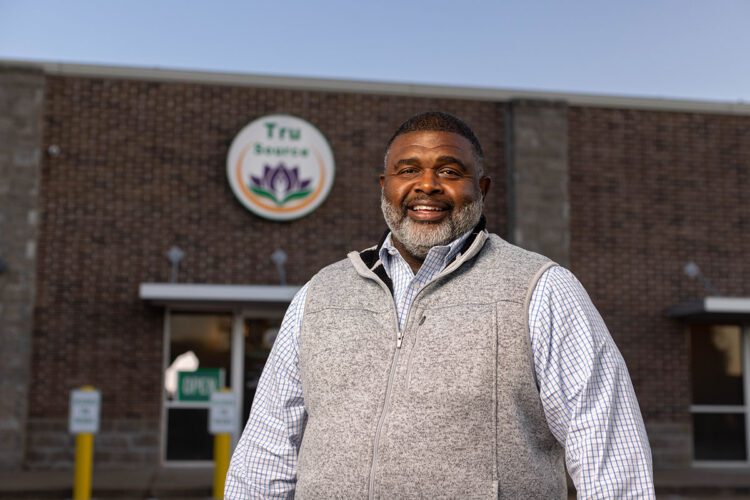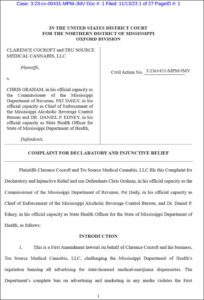Clarence Cocroft, the proprietor of a small dispensary named Tru Source, is challenging Mississippi’s prohibition on medical-cannabis advertising through a federal lawsuit. He asserts that the ban infringes on his rights to free speech by significantly hindering his ability to attract clientele.
In Mississippi, while medical marijuana usage is permitted for individuals with certain medical conditions and a valid medical-cannabis card, legislation restricts advertising by dispensaries and growers.
“Operating in this sector becomes an overwhelming challenge without the ability to advertise, especially when it’s a legal business,” Cocroft expressed during an interview with the Mississippi Free Press on Dec. 8. “Being licensed should inherently grant the right to promote one’s business.”
Cocroft’s Tru Source, located in Olive Branch, Miss., holds the distinction of being the first Black-owned medical-cannabis dispensary in the state. The lawsuit, filed on Nov. 14, names various regulatory authorities, including the Mississippi State Department of Health, the Mississippi Department of Revenue, and the Mississippi Alcohol Beverage Control Bureau, as defendants.
To legally operate a medical-cannabis store in Mississippi, one must secure a dispensary license, register for a sales tax permit, and incur substantial fees. Only individuals over 21 years old and possessing a medical-cannabis card can enter such establishments.
“We comply with all your regulations and pay considerable taxes. All we’re asking for is the permission to advertise, which will also benefit the state’s tax revenue,” Cocroft stated.
For promotion, Tru Source depends on its website, word-of-mouth referrals, and on-site signage. However, Cocroft is barred from using any other advertising channels, a restriction that significantly limits public awareness of his dispensary.
“This advertising limitation isn’t just a problem for my dispensary; it’s an issue that affects every dispensary in Olive Branch, throughout DeSoto County, and in all 82 counties of Mississippi,” he added.
‘A Stalemate for Mississippi’s Cannabis Sector’
The Institute for Justice, a national libertarian law firm, represents Clarence Cocroft in this case. Katrin Marquez, one of Cocroft’s attorneys, emphasized the firm’s focus on how commercial speech regulations and advertising laws are seen through the First Amendment. She pointed out that certain regulations, such as those preventing advertisements targeting children or making false health claims, are sensible, but a complete prohibition on advertising is not.
Although Cocroft initially secured billboard space in northern Mississippi for his dispensary, he was forced to rent these spaces to other legally permissible advertisers, including a casino. He mentioned that the lawsuit and subsequent media coverage have attracted more customers, but his business is still not reaching its full potential.
Cocroft also pointed out the wider impact of the advertising ban, affecting not just dispensaries but also cultivators and consequently the entire medical-cannabis supply chain in Mississippi.
He further commented on the challenges and costs involved in establishing a new type of business in the state, especially in an industry that has historically faced criminalization.
‘Unjustifiable Censorship Under State and Federal Laws’
The Rohrabacher-Farr Amendment, passed by Congress in 2014 and signed by former President Barack Obama, restricts the U.S. Department of Justice from using federal funds to interfere with medical-marijuana operations in states that have legalized such programs. This reflects a broader approach of allowing states to manage access to cannabis independently.
“There’s no justification under state or federal law for this kind of censorship,” Marquez asserted. The case’s outcome could set a precedent for the regulation of other legal businesses.
Cocroft questions the fairness of the advertising restrictions, comparing his inability to advertise his dispensary and medical-cannabis products to the freedom that industries like alcohol, pharmaceuticals, casinos, and strip clubs enjoy in their advertising practices.
The Mississippi Free Press sought comments from the MSDH on the lawsuit but was informed that the department does not comment on ongoing litigation. Attempts to reach the Department of Revenue and the Alcoholic Beverage Control Bureau for their input were also made, but no responses were received before publication.










